翻译中的语法对等
对等译法
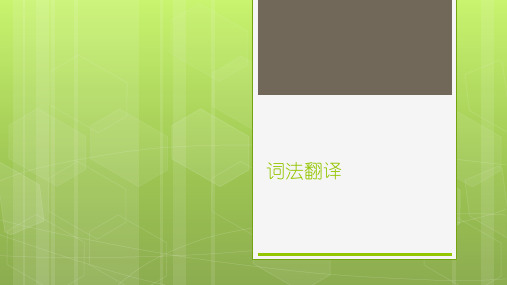
原文字面上没有明显表露出褒义或贬义的词语,必须通过上下文来发掘出句中 词语的感情色彩,忠实的翻译出来。
比喻意义,比喻形式,感情色彩
二、具体译法
具体译法:在翻译过程中,把原文中抽象或者是比较抽象的单 词、词组、成语或句子用具体或者是比较具体的单词、词组、 成语或句子来进行翻译,从而消除或降低语言差别给翻译带来 的损失,使译文产生与原文一样的效果。
具体翻译既包括抽象名词在语义上的具体化手法,也包括抽象 名词在语言形式上的具体化手法,主要是在抽象名词后面加上 范畴词,更包括抽象名词在比喻形象上的具体化手法。
He was in New York the first ten days of March. 三月上旬,他在纽约。(×三月的前十天)
The whole project was completed in a quarter of a year. 整个工程在三个月内就完成了。(×整个工程在四分之一年内就完成了)
三、抽象译法
抽象译法:为了译文的忠实与通顺,我们往往有必要把原文中 带有具体意义或具体形象的单词、词组、成语或句子进行抽象 化处理。
同具体翻译一样,抽象译法一方面包括比喻形象上较为具体的 单词、词组或是成语的抽象化翻译,另一方面,也包括带有范 畴词的具体化名词,在语言形式上的抽象化翻译手法,主要是 在翻译过程中去掉后面的范畴词。
换形译法
英汉两种语言由于有着截然不同的文化背景,在习惯表达上也 就存在着较大的差距,我们不得不在翻译中经常改换表达的形 式。
从语篇分析的角度看翻译中的对等

从语篇分析的角度看翻译中的对等翻译是语言之间的桥梁,它使我们能够理解和欣赏不同语言的文化和思想。
在翻译过程中,对等是最基本也是最核心的概念之一。
本文将从语篇分析的角度来探讨翻译中的对等。
在翻译中,对等关系主要有两种,即文本内对等和文本间对等。
文本内对等是指源语篇和目标语篇在语篇层面上的对等,这种对等的是语言内部的关系,例如句法、词汇和语义等。
而文本间对等则是指源语篇和目标语篇在超语篇层面上的对等,这种对等的是语言之外的因素,例如文化、背景和意识形态等。
从语篇分析的角度来看,翻译中的对等主要体现在以下几个方面:文本功能文本功能是指语言在特定语境中所起的作用。
在翻译中,源语篇和目标语篇的文本功能应该尽可能地一致,这样才能保证翻译的准确性。
例如,原文中的警告、提示和呼吁等功能在翻译后应该保持不变。
文本结构文本结构是指语篇的宏观组织形式,例如叙事结构、论证结构和描述结构等。
在翻译中,源语篇和目标语篇的文本结构应该尽可能一致,这样才能保证翻译的流畅性和连贯性。
例如,在翻译小说时,应该注意情节的展开、人物形象的塑造和场景描写等方面,保持原文的叙事结构。
文本风格文本风格是指语言的表达方式和修辞手法,例如用词、句式、语气和修辞等。
在翻译中,源语篇和目标语篇的文本风格应该尽可能一致,这样才能保证翻译的艺术性和审美性。
例如,在翻译诗歌时,应该注意韵律、节奏和意象等方面,保持原文的修辞手法和表达方式。
在翻译中,对等并不是绝对的,而是具有一定的自由度。
这种自由度允许译者在翻译过程中进行适当的调整和变通,以适应目标语言的习惯和文化背景。
然而,这种自由度并不是无限制的,它必须以保证翻译的准确性和忠实性为前提。
自由度在翻译中的重要性不言而喻。
在保证对等的前提下,适当的自由度可以使翻译更加流畅、自然和易于理解。
它可以帮助译者更好地把握原文的精髓,并将其融入目标语言的语境和文化中。
同时,自由度还可以使译文更具创造性和艺术性,为读者带来全新的阅读体验。
汉语文学英译中的对等规则

汉语文学英译中的对等规则一、引言翻译属于一种跨文化交际,最终目标是把一种文化的信息传递到另一种文化中去,实现对等转换。
翻译中的对等主要是指原文和译文这两种语言在文字和意义上所能达到的最高水准的相同,即译文能完全达到原文所具备的效果。
翻译中对等仅仅一个相对的概念,不对等才是绝对的,完全的对等是不存有的。
很多翻译学家对于翻译中的对等原则都是相当重视的。
本文从语言学、文化和风格三个方面谈谈汉语文学作品英译过程中的对等问题。
二、语言学层次上的对等1.词层对等在汉语作品英译的翻译工作中最基本的问题就是词的问题。
词层从狭义的角度理解就是词汇,从广义的角度理解范围就扩大到词的搭配、组合以及短语。
在汉语文学作品英译过程中,译者要根据上下文的语境,注意词汇的确切翻译,词组的搭配,和词义的言外之意,做到从词层方面达到对等翻译。
如张培基英译的朱自清的《匆匆》:在默默里算着,八千多日子已经从我手中溜去;像针尖上一滴水滴在大海里,我的日子滴在时间的流里,没有声音,也没有影子。
Countingupsilently,Ifindthatmorethan8,000dayshavealreadyslippedawaythroughmyfingers.Likeadropofwate rfallingoffaneedlepointintotheocean,mydaysarequietlydrippingintothestreamoftimewithoutleavingatra ce.“默默”和“一滴水”的翻译属于词层的完全对等,但是“从手中溜走”和“没有声音,也没有影子”就是功能上的一种对等,字面直译意义是不尽相同的,但通过使用中性词、词义色彩接近的词、用文化概念不同的词来代替,或使用意义相等形式相近的词组、习语等的翻译技巧都使其达到了词层上的对等。
在遣词造句中流露出原来散文的美。
2.语法对等词汇并不是影响翻译工作的唯一因素,汉语文学作品的英译也必须通过语法规则使语言得以清楚的表达。
从语篇分析的角度看翻译中的对等

从语篇分析的角度看翻译中的对等一、本文概述翻译作为一种语言间的交流活动,其核心在于如何在保持原文意义的基础上,用另一种语言准确、流畅地表达出来。
在这个过程中,翻译对等性一直是一个重要而复杂的问题。
本文将从语篇分析的角度出发,探讨翻译中的对等性问题。
我们将对语篇分析的基本概念进行介绍,然后阐述翻译对等性的内涵及其在翻译实践中的重要性。
接着,我们将通过具体案例,分析在翻译过程中如何实现不同语言间的对等性。
我们将总结在语篇分析视角下,提高翻译对等性的策略和方法,以期为翻译实践提供有益的参考。
通过本文的探讨,我们期望能够帮助读者更深入地理解翻译中的对等性问题,提高翻译质量和效果。
二、语篇分析理论框架在翻译研究中,对等是一个核心概念,旨在寻求源语和目标语之间的语义、风格和功能的对等。
然而,对等并非简单的逐字逐句对应,而是需要在更大的语境——即语篇的层面上进行理解和实现。
这就引出了语篇分析理论框架在翻译研究中的重要性。
语篇分析理论框架为我们提供了一个全面、系统的视角,使我们能够在更大的语境中理解和处理翻译中的对等问题。
该框架主要包括三个层面:微观结构、中观结构和宏观结构。
微观结构关注的是语言的基本单位,如词汇、短语和句子。
在这一层面,翻译者需要关注源语和目标语之间的语义对等,确保翻译在词汇和句子层面上能够准确地传达原文的含义。
中观结构则关注语篇的连贯性和衔接性。
翻译者需要分析源语语篇中的信息流动和逻辑关系,然后在目标语中重建这种流动和关系,确保翻译在整体上保持连贯和一致。
宏观结构则涉及到语篇的语境和目的。
翻译者需要理解源语语篇的社会文化背景和交际目的,然后在目标语中创造出符合这些背景和目的的翻译,确保翻译在功能上与原文对等。
在这个理论框架下,翻译不再是一个简单的语言转换过程,而是一个涉及到文化、社会、心理等多个层面的复杂过程。
翻译者需要在这个过程中充分发挥自己的主体性和创造性,寻求源语和目标语之间的最佳对等。
英汉翻译中的语用对等
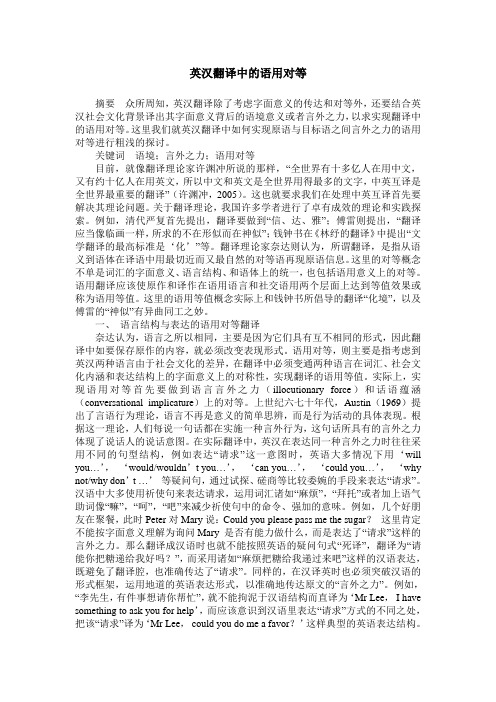
英汉翻译中的语用对等摘要众所周知,英汉翻译除了考虑字面意义的传达和对等外,还要结合英汉社会文化背景译出其字面意义背后的语境意义或者言外之力,以求实现翻译中的语用对等。
这里我们就英汉翻译中如何实现原语与目标语之间言外之力的语用对等进行粗浅的探讨。
关键词语境;言外之力;语用对等目前,就像翻译理论家许渊冲所说的那样,“全世界有十多亿人在用中文,又有约十亿人在用英文,所以中文和英文是全世界用得最多的文字,中英互译是全世界最重要的翻译”(许渊冲,2005)。
这也就要求我们在处理中英互译首先要解决其理论问题。
关于翻译理论,我国许多学者进行了卓有成效的理论和实践探索。
例如,清代严复首先提出,翻译要做到“信、达、雅”;傅雷则提出,“翻译应当像临画一样,所求的不在形似而在神似”;钱钟书在《林纾的翻译》中提出“文学翻译的最高标准是‘化’”等。
翻译理论家奈达则认为,所谓翻译,是指从语义到语体在译语中用最切近而又最自然的对等语再现原语信息。
这里的对等概念不单是词汇的字面意义、语言结构、和语体上的统一,也包括语用意义上的对等。
语用翻译应该使原作和译作在语用语言和社交语用两个层面上达到等值效果或称为语用等值。
这里的语用等值概念实际上和钱钟书所倡导的翻译“化境”,以及傅雷的“神似”有异曲同工之妙。
一、语言结构与表达的语用对等翻译奈达认为,语言之所以相同,主要是因为它们具有互不相同的形式,因此翻译中如要保存原作的内容,就必须改变表现形式。
语用对等,则主要是指考虑到英汉两种语言由于社会文化的差异,在翻译中必须变通两种语言在词汇、社会文化内涵和表达结构上的字面意义上的对称性,实现翻译的语用等值。
实际上,实现语用对等首先要做到语言言外之力(illocutionary force)和话语蕴涵(conversational implicature)上的对等。
上世纪六七十年代,Austin(1969)提出了言语行为理论,语言不再是意义的简单思辨,而是行为活动的具体表现。
英汉翻译中的语义对等

二 、 境 和 文 化 对 语 义 的 影 响 语
语 义 指 的 是 句 子 的 含 义 。 语 义 可 以 分 为 语 法
“ 同化 ”就 是 译 出 本 质 内涵 , 管 有 适 当 取 舍 和 变 尽
之 间的语 义对 等 。在 整个 翻译 过 程 中 , 翻译 言
在语 义对 等 的基础 上 进 行 。也 就 是说 , 这是 从 原 语 到译 语 的一种 语义 转 换 , 把一 种 语 言 表 达 的 内容 是 用另 一种 语 言 的 恰 当形 式 表 达 出来 l 。由 于 译 语 _ 2 ] 与原 语 的差 别 , 人 文 化 与 本 土 文 化 的差 异 , 译 译 对
e ui a e e,t a l ton o f e e y sofw rtng ha e p c i e r qu r m e t . Thi he r f q v lnc r nsa i fdif r ntt pe ii s r s e tv e ie ns st o y o
t a l ton,s ma tc e ui lnc , c n r a h o h s me ”r s rc e on r nsa i e n i q va e e a b e k t r ug o e t i t d z e” t t s e t be ha e ms o un r ns a a e i r n l ton fe d t a 1 t bl n t a s a i i l . Ke r :Tr ns a i n;Se a i y wo ds a lto m ntc Equ v l nc i a e e;Con e t t x ;Ty e fW r tng;Unt a s a a e p so ii r n l t bt
对等译法在词语翻译时的运用及局限性,原因,及解决办法

对等译法在词语翻译时的运用及局限性,原因,及解决办法对等译法,或等值译法,是翻译过程中最基本的一种方法,也是最为重要的一种方法。
所谓对等,是指我们可以在译文语言中找到同原文中某个单词,词组,或成语,形式或意义上的对等表达。
就语言而言,由于语言是表达人类思维的载体,所以两种语言中确实都能找到对等表达的现象。
当然,这种情况一般只限于意义比较单一,没有经过引申或意义转变的单词,短语或成语。
1.1在英语和汉语中在单词层面上对等情况比较多。
一些表示地理和人名的专有名词及术语,如New York, “纽约”,, Mississippi “密西西比河”,John, “约翰”,triangle 三角形,square平方等。
当然,我们也可以有其他的译法,比如说把New York 译成“纽约克”,Mississippi 译成“米丝丝皮”,John 译成“江”,等等。
但是我们要意识到,英文中有些专有名词的翻译在汉语中已经达成了共识,并且为大众所接受,只能有一种译法了。
比如上面的例子,译成其他的无法让人理解。
在这个意义上来说,专有名词及术语的翻译可以认为是绝对对等。
除专有名词外,一些词义单一的普通名词,在汉语中只能找到一个对应,例如普通名词中如门,窗,玻璃,一些动植物的名称,如狮子,老虎,马等,蔬菜水果,如苹果,梨等,基本上都可以做到很好的对应。
1.2另外英语中有些成语,谚语,都可以找到无论在形式上还是在意义上都与之对应的中文表达。
如to fish in the trouble water 浑水摸鱼, walls have ears 隔墙有耳, be a notch above 略胜一畴rack one’s brain绞尽脑汁, to kill two birds with one stone 一石二鸟等,The spirit is willing, but the flesh is weak.心有余而力不足Practice makes perfect. 熟能生巧God helps those who help themselves.自助者,天助之Go through fire and flood. 赴汤蹈火对于这样的情况,我们可以称之为绝对对等2.1 更多是形态上不对等,意义上对等,如green house , white coffee, black coffee,black tea ,dog days, 三伏天黑色金属,有色金属ferrous metal,nonferrous metal 吃醋绿帽子,在苏格兰,有一个节日,大家都带绿帽子,穿绿衣,Saint Patrick’s Daydrink like a fish牛饮eat like a bird, work like a dogmeet one’s waterloo走麦城green with envy 红眼病,it rains cats and dogs 倾盆大雨you are pulling my leg,你在开玩笑black sheep, blue blood 贵族血统As wise as an owlA flash in the pan 昙花一现Be outnumbered 寡不敌众Get off on the wrong foot 出师不利Throw one’s hat in the rain 决一死战Once in a blue moon 千载难逢我们可以看出,当形式与意义发生矛盾的时候,我们要力求意义上的统一,而舍弃形式上的统一。
翻译中的语法对等

翻译中的语法对等Translation can be viewed as a creative job. It involves some knowledge of source language and target language. So it is difficult for translators to grasp the grammar of original language. In the progress of translation practice, the grammar context limits the translation, and can not properly express the original meanings of text. The result is that the translation is not pure or smooth. Therefore, it is necessary to notice the grammatical phenomenon to make translation flu ent an d fai thful.When translating a text or a sentence, it is unavoidable to meet the problems of the tense and voice of the verbs, the translation of adverbs and adjectives. Generally, when a translator deal with the tense and voice, he only adds to the Chinese character “着”, “了”, “过” and “被”. And when he translates the adverbs and adjectives, he just uses the Chinese character “地” and “的”.For example:1) “I passed you on the road?”“Monseigneur, it is true. I had the honor of being passed on the road.”原译:“在路上我屡次经过你面前了吗?”“爵爷,是的。
论西方的翻译对等概念
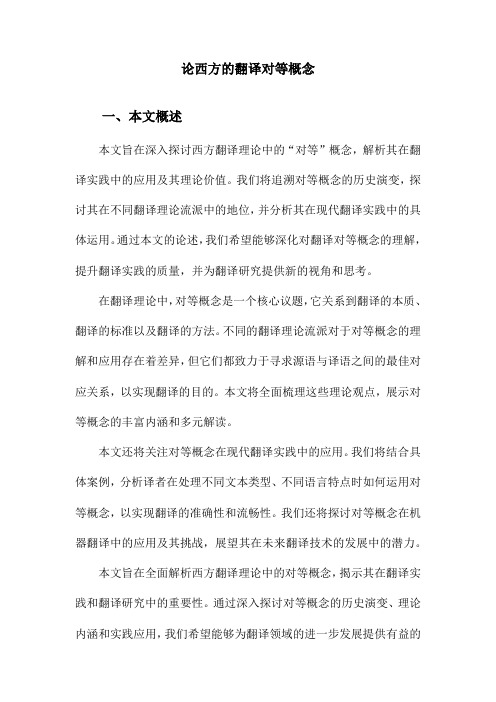
论西方的翻译对等概念一、本文概述本文旨在深入探讨西方翻译理论中的“对等”概念,解析其在翻译实践中的应用及其理论价值。
我们将追溯对等概念的历史演变,探讨其在不同翻译理论流派中的地位,并分析其在现代翻译实践中的具体运用。
通过本文的论述,我们希望能够深化对翻译对等概念的理解,提升翻译实践的质量,并为翻译研究提供新的视角和思考。
在翻译理论中,对等概念是一个核心议题,它关系到翻译的本质、翻译的标准以及翻译的方法。
不同的翻译理论流派对于对等概念的理解和应用存在着差异,但它们都致力于寻求源语与译语之间的最佳对应关系,以实现翻译的目的。
本文将全面梳理这些理论观点,展示对等概念的丰富内涵和多元解读。
本文还将关注对等概念在现代翻译实践中的应用。
我们将结合具体案例,分析译者在处理不同文本类型、不同语言特点时如何运用对等概念,以实现翻译的准确性和流畅性。
我们还将探讨对等概念在机器翻译中的应用及其挑战,展望其在未来翻译技术的发展中的潜力。
本文旨在全面解析西方翻译理论中的对等概念,揭示其在翻译实践和翻译研究中的重要性。
通过深入探讨对等概念的历史演变、理论内涵和实践应用,我们希望能够为翻译领域的进一步发展提供有益的启示和借鉴。
二、翻译对等概念的起源与发展翻译对等概念,作为翻译理论的核心组成部分,其起源可追溯至古代的东西方文化交流时期。
在古希腊,哲学家赫拉克利特便提出了“语言的转换应追求意义对等”的观点,这可以说是对等翻译概念的雏形。
然而,这一概念在早期的翻译实践中并未得到广泛应用,大多数翻译工作更注重直译或音译。
随着文艺复兴的到来,人文主义思潮推动了翻译对等概念的进一步发展。
学者们开始强调翻译时应保持原文的意义和风格,使得读者能够领略到原文的精神风貌。
到了19世纪末,随着语言学研究的深入,语言学家开始从语言学角度探讨翻译对等,提出了形式对等和动态对等两种观点。
进入20世纪,翻译对等概念得到了更为深入的研究和发展。
奈达提出的“动态对等”理论,即“功能对等”,强调翻译应追求原文与译文在读者反应上的对等,而非简单的文字对应。
翻译功能对等理论在句子层面上应用举例
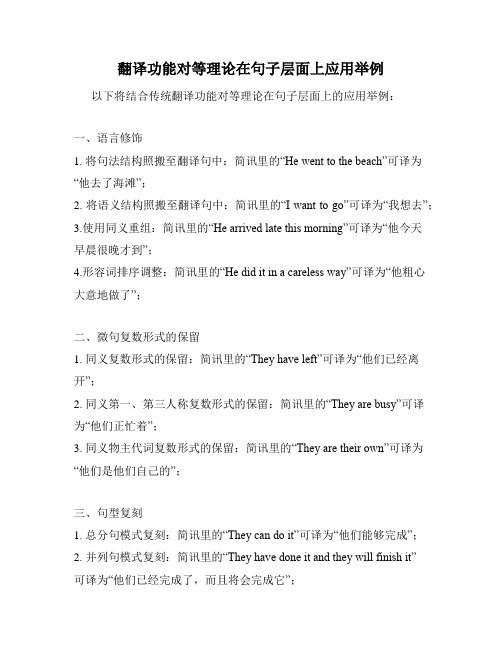
翻译功能对等理论在句子层面上应用举例以下将结合传统翻译功能对等理论在句子层面上的应用举例:一、语言修饰1. 将句法结构照搬至翻译句中:简讯里的“He went to the beach”可译为“他去了海滩”;2. 将语义结构照搬至翻译句中:简讯里的“I want to go”可译为“我想去”;3.使用同义重组:简讯里的“He arrived late this morning”可译为“他今天早晨很晚才到”;4.形容词排序调整:简讯里的“He did it in a careless way”可译为“他粗心大意地做了”;二、微句复数形式的保留1. 同义复数形式的保留:简讯里的“They have left”可译为“他们已经离开”;2. 同义第一、第三人称复数形式的保留:简讯里的“They are busy”可译为“他们正忙着”;3. 同义物主代词复数形式的保留:简讯里的“They are their own”可译为“他们是他们自己的”;三、句型复刻1. 总分句模式复刻:简讯里的“They can do it”可译为“他们能够完成”;2. 并列句模式复刻:简讯里的“They have done it and they will finish it”可译为“他们已经完成了,而且将会完成它”;3. 主从句模式复刻:简讯里的“They have finished it because they were given enough time”可译为“他们完成了,因为他们获得了足够的时间”;四、句法形式重建1. 扩写:简讯里的“You should come soon”可译为“你应该尽快过来”;2. 收缩:简讯里的“They have gone to the library”可译为“他们去图书馆了”;3. 意义保留:简讯里“He was studying”可译为“他正在学习”;五、前置状语1. 时间前置状语:简讯里的“Today, they went to the zoo”可译为“今天,他们去了动物园”;2. 原因前置状语:简讯里的“Because it was a sunny day, we went to the beach”可译为“因为是个晴朗的一天,我们去了海滩”;3. 目的前置状语:简讯里的“To prepare for the test, he read every day”可译为“为了准备考试,他每天都在阅读”;综上所述,翻译功能对等理论在句子层面上的应用包括:语言修饰、微句复数形式的保留、句型复刻、句法形式的重建以及前置状语的应用。
翻译过程中的完全对等和有效翻译

翻译过程中的完全对等和有效翻译翻译过程中的完全对等和有效翻译[摘要]翻译理论的发展已有两千多年的历史,翻译的过程就是正确理解原文和创造性地用另一种语言再现原文的过程。
对于这一过程的研究,很多学者付出艰辛的努力和工作,但是无论译者采用什么样的翻译方法和策略,翻译中完全对等是不可能实现的,但是有效翻译是完全有可能实现的。
[关键词]翻译完全对等有效翻译一、完全对等翻译的不可能性交际是语言的基本功能,也是人类得以生存发展的手段,翻译在持不同语言的两国人的交际过程中起到重要的作用。
译者总是想使原文与译文无论是在内容上、形式上还是风格上达到完全一致的对等,但是完全一致的对等是个理想状态,很少能够达到,这归根于以下原因。
1.任何两种语言之间都是有距离和差异的由于人类的语言、文化之间存在着诸多差异,诸如生态环境、物质文化、社会习俗、宗教文化等方面的差异给翻译带来许多障碍,这多方面的差异必然在语言中有所反映,比如文化的缺项造成语言词汇的缺项(刘利华,1999)。
一种语言中的某个词、短语或某句话不一定能够在另一种语言中找到与它在内涵和外延意义上完全相同的对等语。
在这种情况下,如果译者找不到对等的翻译,至少可以做到对应翻译。
如:“水中捞月”被翻译成英语应为“to fish in the air”,“木已成舟”被翻译为“what is done cannot be undone”,“瓮中之鳖”被翻译为“a rat in the hole”等等。
2.语言根植于文化并从属于文化,文化在文字翻译中起到举足轻重的作用在保持原文文化色彩与译文的可理解性之间译者有时只能取其一。
尽管有时译者可采取一些措施来弥补这一损失,如加注解、加解释等,但是这些方法只是在一定程度上有效。
译文永远不能译出原文所包含的所有信息和情感联想,这一观点在某一则广告翻译中得到体现。
如中国有名的电池品牌“白象”的英译,白象被译成“white elephant”。
翻译对等理论
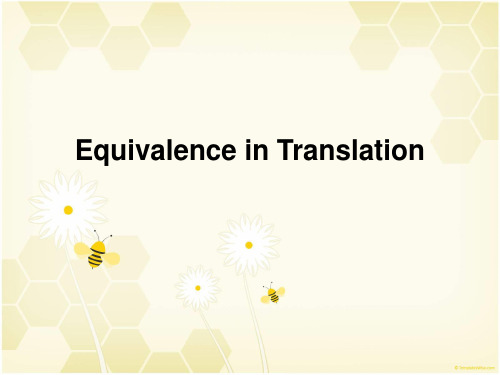
奈达:������ 形式对应������ (formal correspondence)和动态对等������ (dynamic equivalence) • 奈达翻译理论形成于20 世纪60年代并于80年代介绍到中 国, “功能对等”是他的中心翻译思想之一 • 1964年, 奈达在《翻译科学探索》中首次提出了“动态对 等”的概念, 提出将翻译研究的重点从对静态的文本信息 的关注转移到读者对文本动态信息的关注。 在1969年的《翻译理论与实践》中, 奈达再次定义说: “ 动态对等就是译文读者对译文所作出的反应与原文读 者对原文所作出的反应基本一致”。 这里的动态对等就是指功能对等
三、翻译对等的类型
There are three types of translation equivalence: Stylistic equivalence socio-cultural equivalence linguistic equivalence:is divided into pragmatic,semantic,and grammatical equvilence,the highest priority is credited to pragmatic equvialence and then semantic equivalence has priority over grammatical equivalence
The major theory
1.雅各布逊和他的“差异中的对等”
雅各布逊在他名为《论翻译的语言学观������ 》 (1959)这篇文章中,论述了三 种翻译类型:语际(interlinguistic)翻译、语内(intralinguistic)翻译和语符翻译 (intersemiotic)(Jakobson1959)。他认为在语内翻译时,译者为了清楚地表达 信息,可以使用同义词,这就意味着语码单位之间通常没有完全的对等,从语 法的角度来看,语言本身存在差异,译者翻译时可能面临找不到对应词语的问 题,但这并不意味着语言不可译。他承认������ 专有名词可以用外来语(loan words)、直译语(loan translation)、新语(neologism)、语义转换(semantic shifts)和迂回表达法(circum locutions)等来引述������ (Jakobson1959:)。他强 调译者在翻译过程的重要地位,认为在没有与原文词、句对应的情况下,就该 由译者来选择最合适的方法进行翻译。由此可见,雅各布逊的理论是以符号学 为基础的,译者首先对源语信息进行编码,然后再把它转换成目的语相应的信 息。
英汉互译原理

英汉互译原理
英汉互译是翻译工作中的重要内容,它涉及到两种语言间的语言表达和文化传达。
在进行英汉互译时,需要遵循一定的原则和方法,以确保翻译质量和表达准确。
下面将对英汉互译的原理进行详细介绍。
首先,英汉互译的原理之一是语言对等原则。
在进行英汉互译时,需要尽量保持原文和译文在语言表达上的对等性,即在语言风格、语法结构、语义表达等方面尽量与原文保持一致。
这样可以更好地传达原文的意思和情感,使译文更加自然流畅。
其次,英汉互译需要遵循意译原则。
由于英汉两种语言在语言结构和表达方式上存在差异,有些表达方式在英文中常见,在汉语中则需要进行意译。
因此,在进行英汉互译时,需要根据原文的语境和意思,进行灵活的语言转换和表达,以使译文更符合目标语言的表达习惯和文化背景。
另外,英汉互译还需要考虑到文化因素。
文化是语言的载体,不同的文化背景会对语言的表达产生影响。
在进行英汉互译时,需要充分考虑原文所处的文化环境,尊重原文的文化内涵,同时也要
根据译文的受众和文化环境进行恰当的文化调整,以确保译文更好地传达原文的意思和情感。
此外,英汉互译还需要注重语言的精准性。
在进行翻译时,需要尽量准确地理解原文的意思,并用精准的语言表达来传达原文的意思。
避免模糊的表达和歧义的翻译,以确保译文的准确性和可理解性。
总之,英汉互译的原理涉及到语言对等、意译、文化因素和语言精准性等方面。
在进行英汉互译时,需要综合考虑这些原理,灵活运用各种翻译技巧,以确保译文准确、流畅、符合语言习惯和文化背景,从而更好地传达原文的意思和情感。
动态对等翻译
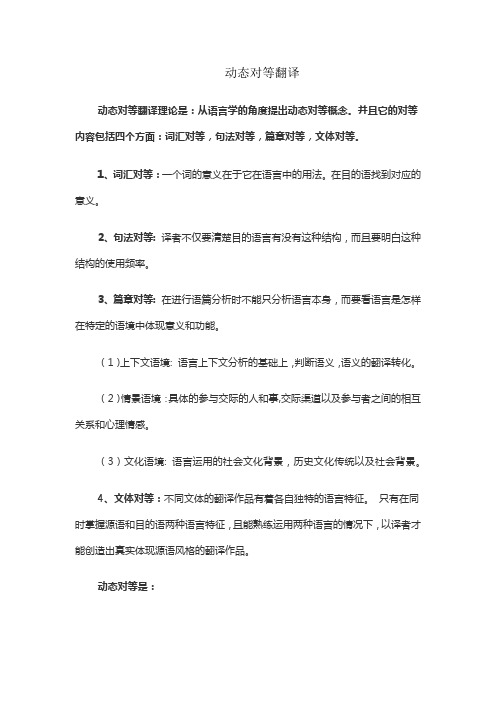
动态对等翻译动态对等翻译理论是:从语言学的角度提出动态对等概念。
并且它的对等内容包括四个方面:词汇对等,句法对等,篇章对等,文体对等。
1、词汇对等:一个词的意义在于它在语言中的用法。
在目的语找到对应的意义。
2、句法对等: 译者不仅要清楚目的语言有没有这种结构,而且要明白这种结构的使用频率。
3、篇章对等: 在进行语篇分析时不能只分析语言本身,而要看语言是怎样在特定的语境中体现意义和功能。
(1)上下文语境: 语言上下文分析的基础上,判断语义,语义的翻译转化。
(2)情景语境:具体的参与交际的人和事,交际渠道以及参与者之间的相互关系和心理情感。
(3)文化语境: 语言运用的社会文化背景,历史文化传统以及社会背景。
4、文体对等:不同文体的翻译作品有着各自独特的语言特征。
只有在同时掌握源语和目的语两种语言特征,且能熟练运用两种语言的情况下,以译者才能创造出真实体现源语风格的翻译作品。
动态对等是:“动态对等”是指“与源语信息最切进而又自然的对等”,它包含三层意思:(1)对等,针对源发语信息(翻译的根本任务是求得译文与原文的对等)。
(2)自然,针对接收者语言(使译文行文自然,不带翻译腔)。
(3)最切近,以最高近似值为基准,将前两种取向结合在一起(不论是语内交际还是语际交际,两篇不同的话语之间并无绝对对等可言)”。
并且“动态对等”的核心就是“接受者对转达到接受者语言中的原文信息的反应,大体上应与原文接受者的反应一样”。
也就是说,翻译的目标是使表达完全自然,这种自然除了指语言通顺,还包括适应读者的文化和思想习惯,并不要求读者对源语的文化有所了解。
1. 所谓动态对等的翻译,实际上就是翻译交际理论指导下的翻译,具体说来就是指“从语义到语体,在按受语中用切近原文的自然对等语再现源语信息。
”2. 重点:①自然,指译文不能有翻译腔②切近,指在“自然”的基础上选择意义与原文最接近的译文③对等,这是核心,“自然"也好,“切近”也好,都是为了寻找对等语服务的。
对等翻译理论

对等翻译理论对等翻译理论是翻译学中的一种翻译理论,强调在翻译过程中应该尽量遵循源语言和目标语言之间的对等关系。
这一理论提出了一系列具体的翻译方法和原则,旨在实现最佳的翻译效果。
对等翻译理论首先强调了源语言和目标语言之间的对等关系。
这意味着在翻译时,应该尽量保持源语言和目标语言的信息和意义的等价性。
也就是说,在翻译过程中,应该尽量不改变源语言句子的意义,并且用目标语言恰当的语言表达方式来传达源语言的信息。
这一原则要求译者对源语言和目标语言都具有很高的语言能力,并且对两种语言的语言表达方式都很熟悉。
其次,对等翻译理论提出了两种具体的翻译方法:直译和意译。
直译是指尽量按照源语言的语言结构和表达方式进行翻译,保持源语言的风格和特点。
意译是指在尽量保持源语言意义的基础上,根据目标语言的语言规则和表达方式进行翻译,使译文更符合目标语言的习惯和习惯。
译者可以根据具体的翻译任务和需求来选择合适的翻译方法。
对等翻译理论还提出了一系列辅助翻译的原则和技巧。
例如,要根据译文的实际用途和受众的需求进行翻译,并注重翻译的可读性和可理解性。
此外,还应尽量避免译文中的歧义和不一致,并根据文化背景和语言习惯进行必要的文化调整。
同时,译者还应保持积极主动的态度,主动寻求正确的翻译方法和解决问题的方案。
对等翻译理论在一定程度上弥补了其他翻译理论的不足。
传统的翻译方法中,常常以目标语言的规则和要求为准,忽视了源语言的特点和表达方式。
而对等翻译理论则通过强调对等关系,让翻译更加注重源语言的信息和意义的传达,使译文更准确、自然和流畅。
然而,对等翻译理论也存在一些局限性。
由于不同语言的语言结构和表达方式的差异,有时候可能无法实现完全的对等翻译。
此外,对等翻译理论也没有提供明确的解决方法,译者仍然需要根据实际情况灵活运用不同的翻译方法和技巧。
总之,对等翻译理论强调源语言和目标语言之间的对等关系,并提出了一系列的翻译方法和原则。
它为翻译实践提供了有益的指导,可以帮助译者更好地实现翻译的准确和流畅。
翻译中的对等问题
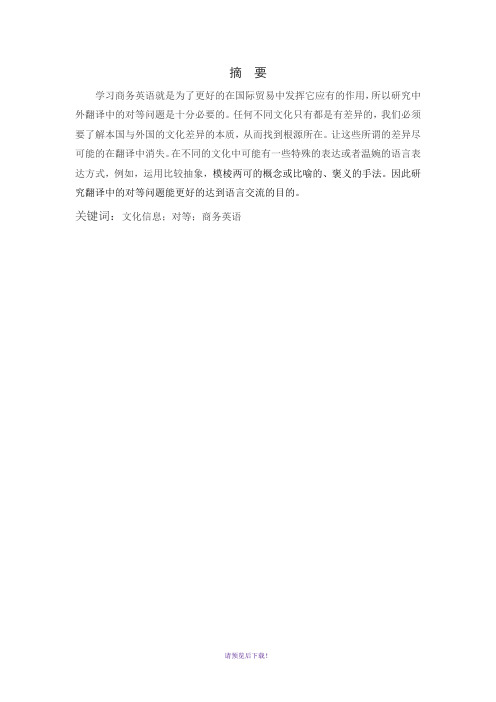
学习商务英语就是为了更好的在国际贸易中发挥它应有的作用,所以研究中外翻译中的对等问题是十分必要的。
任何不同文化只有都是有差异的,我们必须要了解本国与外国的文化差异的本质,从而找到根源所在。
让这些所谓的差异尽可能的在翻译中消失。
在不同的文化中可能有一些特殊的表达或者温婉的语言表达方式,例如,运用比较抽象,模棱两可的概念或比喻的、褒义的手法。
因此研究翻译中的对等问题能更好的达到语言交流的目的。
关键词:文化信息;对等;商务英语摘要------------------------------------------------------------------------ I 第1章英汉互译中的中西方文化差异--------------------------------------- 1 1.1 东西方价值观念的差异------------------------------------------ 2 1.2 对事物认识差异------------------------------------------------------ 2 1.3 语言习惯的差异------------------------------------------------ 3第2章翻译要达到基本信息对等-------------------------------------------- 5 2.1 原文与译文语义信息的对等 ------------------------------------------ 6 2.2 原文与译文风格信息的对等-------------------------------------- 6第3章翻译的技巧--------------------------------------------------- 9 3.1 中英对比法---------------------------------------------------- 9 3.2 懂得词类的转化------------------------------------------------ 9 第4章结语-------------------------------------------------------- 10参考文献----------------------------------------------------------- 11致谢--------------------------------------------------------------- 12第1章英汉互译中的中西方文化差异由于中西方社会习俗、历史发展、文化传统、价值观念等诸多方面存有明显差异,不同语言的语用功能不尽相同。
意义对等是根本——谈谈翻译中的对等
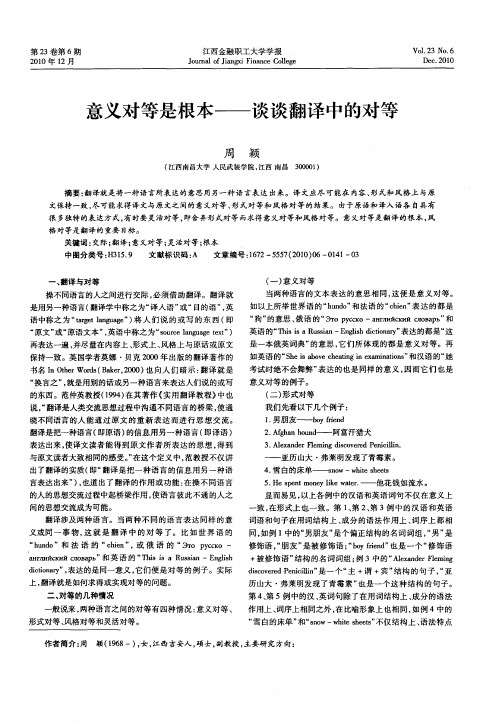
翻译涉及两种语 言。当两种不 同 的语 言表 达同样 的意
义或同一 事 物 , 就 是 翻译 中 的对 等 了。 比如 世 界 语 的 这
“ ud ”和 法 语 的 “ he ” 或 俄 语 的 “ " yco — h no ci , n 3r p c o x ar  ̄crt.  ̄p ” rm rf n a b 和英 语 的 “ Si aR si [ co s us n—E g s a nlh i dc oa ” 表达 的是同一意义 , it nr , i y 它们便 是对等 的例 子。实际 上, 翻译 就是如何求得或实现对等的问题 。
当两 种语 言的文本表达 的意思相 同 , 便是意 义对 等。 这
如以上所举世 界语 的“ ud ” h n o 和法语 的“ he ” 达 的都 是 cin 表 “ 的意思 、 语 的“ T yco—arH cM n Bp ” 狗” 俄 3 opcx H皿 盘 K co al 和 , 英语 的“ hsi a us —E gi co a ” T i s si R a n nlhd tnr 表达的都 是“ si i y 这 是一本俄英词典 ” 的意思 , 它们所体 现的都是 意义对 等。再
说 ,翻译是人类交流思想过程中沟通不同语 言的桥梁 , “ 使通 晓不 同语言的人 能通 过原 文 的重新 表达 而进 行思 想交 流。
翻译是把一种语 言( 即原语 ) 的信息用另一 种语 言 ( 即译语 )
表达 出来 , 使译文读者 能得到原 文作者所 表达 的思想 , 得到
2 Mga on—— 阿富汗猎犬 . hnhud
一
、
翻译与对等
操不 同语言的人之间进行交 际 , 必须借 助翻译 。翻译 就 是用另一种语言 ( 翻译学 中称之为“ 译人语 ” “ 或 目的语 ” 英 , 语中称之为 “agt agae ) 人们 说 的 或写 的东 西 ( tr n ug ” 将 el 即 “ 原文” 原语 文本 ” 英语 中称之为“o r n aet t ) 或“ , suc l g g x” e au e 再表达一遍 , 并尽量在 内容上 、 形式上 、 风格上与原话或 原文
翻译对等理论
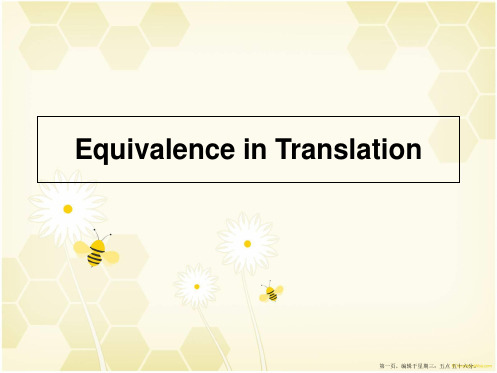
model,and scientific methods to analyze meaning in
his work on Bible translating.
3. Nida’s concepts of formal equivalence and dynamic
张美芳教授1999年在其论文“从语境分析看动态对等论的局限性
”中指出,奈达提出的“动态对等”存在某种程度上的缺陷。她
以分析查良镛先生写在香港回归之日的一篇文章为基础指出,在
下列情况下,“动态对等”不能取得:
“原文与译文的目的不一致时,其功能不可能对等;接受者
的文化背景和阅读经验不相同时,读者反应不可能对等;译语语
以使用同义词,这就意味着语码单位之间通常没有完全的对等,从语法的角度来看
,语言本身存在差异,译者翻译时可能面临找不到对应词语的问题,但这并不意味着语言
不可译。他承认 专有名词可以用外来语(loan words)、直译语(loan
translation)、新语(neologism)、语义转换(semantic shifts)和迂回表达法(circum
Equivalence in Translation
第一页,编辑于星期三:五点 五十六分。
Equivalence in Translation
一、什么是对等
二、对等理论的发展
三、翻译对等的类型
四、翻译界对对等理论的争论
第二页,编辑于星期三:五点 五十六分。
一、什么是对等
Equivalence refers to the description of one thing in different
尤金奈达翻译理论

01
总之,尤金·奈 达的翻译理论是 一种以交际功能 和读者反应为核 心的理论
动态对等
02
他强调了翻译过 程中对等的重要 性,并提出了"最 贴近的自然对等" 的概念
03
这种理论对于指 导翻译实践具有 重要的意义
-
请各位老师批评指正!
THESIS DEFENSE POWERPOINT
XXXXXXXXXX
-
1 功能对等 2 动态对等
尤金奈达翻译理论
1
尤金·奈达(Eugene A. Nida) 是一位著名的语言学家和翻译 理论家,他的翻译理论在西方
翻译界有着广泛的影响力
2
奈达的翻译理论主要 包括"功能对等"和" 动态对等"两个方面
1
功能对等
功能对等是指翻译的文本应该在语言和语义上与原文本保持一致,从而能够达到与原文本 相同的功能和效果。这种理论强调翻译的交际功能,即翻译应该使读者能够理解和欣赏原 文本所表达的意思和情感
指导老师:XXX
答 辩 人 :XXX
奈达认为,翻译过程中的对等包括词汇对等、语法对等、语义对等和风格对等。词汇对等 是指翻译文本中的词汇应该与原文本中的词汇保持一致,从而避免歧义和误解。语法对等 是指翻译文本中的语法结构应该与原文本的语法结构保持一致,从而保持原文本的流畅性 和准确性。语义对等是指翻译文本应该与原文本在语义上保持一致,从而避免误解和歧义 。风格对等是指翻译文本应该与原文本在风格上保持一致,从而保持原文本的个性和特点
为了实现功能对等,奈达提出了"最贴近的自然对等"的概念。他认为,翻译应该追求自然 、流畅的效果,而不是刻意的模仿或生硬的翻译。在翻译过程中,译者应该理解原文本的 文化背景、语言特点、修辞手法等方面的因素,从而在目标语言中找到最贴近的表达方式
- 1、下载文档前请自行甄别文档内容的完整性,平台不提供额外的编辑、内容补充、找答案等附加服务。
- 2、"仅部分预览"的文档,不可在线预览部分如存在完整性等问题,可反馈申请退款(可完整预览的文档不适用该条件!)。
- 3、如文档侵犯您的权益,请联系客服反馈,我们会尽快为您处理(人工客服工作时间:9:00-18:30)。
翻译中的语法对等
Translation can be viewed as a creative job. It involves some knowledge of source language and target language. So it is difficult for translators to grasp the grammar of original language. In the progress of translation practice, the grammar context limits the translation, and can not properly express the original meanings of text. The result is that the translation is not pure or smooth. Therefore, it is necessary to notice the grammatical phenomenon to make translation fluent and faithful.
When translating a text or a sentence, it is unavoidable to meet the problems of the tense and voice of the verbs, the translation of adverbs and adjectives. Generally, when a translator deal with the tense and voice, he only adds to the Chinese character “着”, “了”, “过” and “被”. And when he translates the adverbs an d adjectives, he just uses the Chinese character “地” and “的”.
For example:
1) “I passed you on the road?”
“Monseigneur, it is true. I had the honor of being passed on the road.”
原译:“在路上我屡次经过你面前了吗?”
“爵爷,是的。
我曾经有过被经过的荣幸。
”(Fan 4)
Looking at the translation, it is too uncomfortable to read. When translating the past tense “passed”, it is translated to “经过了”, but the word “honor”, its parts of speech is changed. And the meaning of the whole translated sentence is not clear. The reason is that the translation is restricted by the phrase “of being passed” and the passive voice of the structure “being passed”. In fact, the meaning of the sentence is that it is the servant’s honor to meet Monseigneur on the road. So the translation is as follows:
“我多次在路上从你面前经过了吗?”
“爵爷,是的。
在路上能够看到您从我面前经过深感荣幸。
”
2) The report noted proposals that eating less fat and more food with whole grains other fibers can protect against cancer.
原译:这份报告特别提到了“少食脂肪,多吃含全粮食物和其他纤维素的食物能预防癌症的那些建议。
(ibid. 5)
It is obvious to find that attributive clauses in the original sentence are arranged without being adjusted. It is not idiomatic Chinese, although it is not wrong grammatically. It makes readers confused.
3) 语言这个东西不是随便可以学好的,非下苦功夫不可。
原译:Language is not easy to learn, you must pay great effort. (ibid. 5) According to the rules of English grammar, the translation is right. But it is not idiomatic English because the number of the use of nouns is more than that of verbs. The Chinese character “学好”is a verb, while it is usually translated to a noun “mastery” in English. So it is necessary to adjust the order of words. And meanwhile, the parts of speech of the Chinese character “随便”need to be changed into a adjective. So the idiomatic translation is as follows:
The mastery of language is not easy and requires painstaking effort.
范仲英·实用翻译教程[M]·北京:外语教学与研究出版社,1994.
I decided on the boat. .
If translated from the aspect of the grammatical basis,this sentence can have two different interpretations. If we take “decide on” as a set phrase, it means“choose” in this sentence. If we take “on” as a preposition, it indicates another meaning, that is I decided something on the boat.
I like Tom better than Mary.
This sentence also has two different interpretations. One is “I like Tom better than 1 l ike Mary”. The other is “ I like Tom better than Mary likes Tom”.
In fact, we have to put it in a certain kind of context so that we can catch the correct meaning based on the above examples. Wen can understand the sentence accurately that you like Tom better than you like Mary in the correct context. English grammar is very complex, and it involves various kinds of problems, such as concord, information, structure and emphasis, cohesion apart from the basic clause structures.。
